About
Clean tech investments present unique educational opportunities
In 2016 the City of New York was poised to install large scale solar panel systems on more than 100 public school buildings in just a few years. The agencies engaged in the rollout of these projects seized the opportunity to link these investments to student learning and improve climate education literacy in the largest school system in the country. To build a community of learning around clean energy investments and sustainability the City of New York created the NYC Solar Schools Program, an integrated partnership of government agencies, environmental nonprofits, and educators.

This case study highlights the components of these programs and distills the lessons learned into a set of best practices that other municipalities can adapt to build a culture of learning and climate literacy around investments in clean energy and climate change mitigation.
Process
A collaborative partnership fostered the NYC Solar Schools movement
The working group created to develop the NYC Solar Schools effort was fundamental to the success of the program. Having identified the unique opportunity available to create an education program that revolved around the City’s extensive solar power installation program, this partnership worked together to secure funding and develop the structure and format of the program. The members of this group were careful to work collaboratively while also recognizing and taking advantage of each other’s strengths. They included the Division of Energy Management within the New York City Department of Citywide Administrative Services (DCAS), the Office of Sustainability (DOE Sustainability) within the New York City Department of Education (DOE), and Solar One, an environmental non-profit with extensive educational programming.
![]()
A diverse curriculum, careful engagement, and a flexible attitude are key to success
Training: The NYC Solar Schools program follows a “train the trainer” model, with a series of professional development workshops organized to train teachers on the incorporation of new lessons into existing curriculum. Designed to prepare teachers to utilize the lessons on their own across the school year, workshops are an efficient means of knowledge sharing and teacher preparation that reaches hundreds of teachers per year, and, through those teachers, thousands of students.
Curriculum: The full NYC Solar Schools curriculum covers a broad range of subjects, including energy, electricity, climate, energy efficiency, and renewable energy—with a specific emphasis on solar photovoltaic (PV) systems. Lessons are predominately used in science classes but have been incorporated in humanities courses as well. All are drawn from Solar One’s full Green Design Lab curriculum, which explores environmental sustainability through the lens of energy, air quality, water, food, and materials.
Toolkits: Participating schools are provided with a toolkit of materials that teachers can use to assist in the delivery of lessons. Toolkits are mainly non-consumables that can be used repeatedly such as watt meters, mini solar panels, alligator clips, motors, and multimeters—providing an important hands-on facet to the educational program.
Continuous Engagement: To keep the community of teachers engaged, the program utilizes an online platform to support continued communication, build a broader network, and enable sharing of best practices. As the program continues to grow, DOE Sustainability and Solar One will continue to refine the curriculum and add new lessons, activities and resources informed by teacher feedback and the changing needs of the student body.
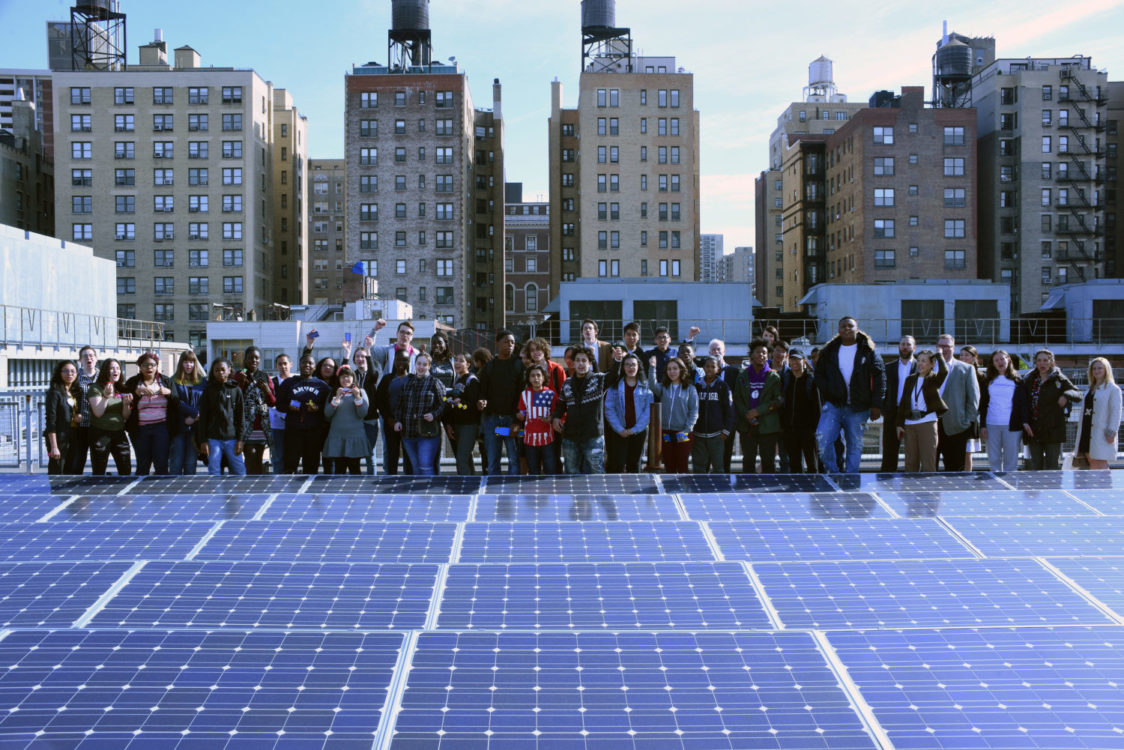
Project Team
Yetsuh Frank
Building Energy Exchange
Ellen Zielinski
NYC DCAS DEM
Jacqueline Espinal
NYC DCAS DEM
Sarah Pidgeon
Solar One
Karen Alsen
Solar One
Meredith McDermott
Office of Sustainability, NYC DOE
Christine Johnson
Office of Sustainability, NYC DOE
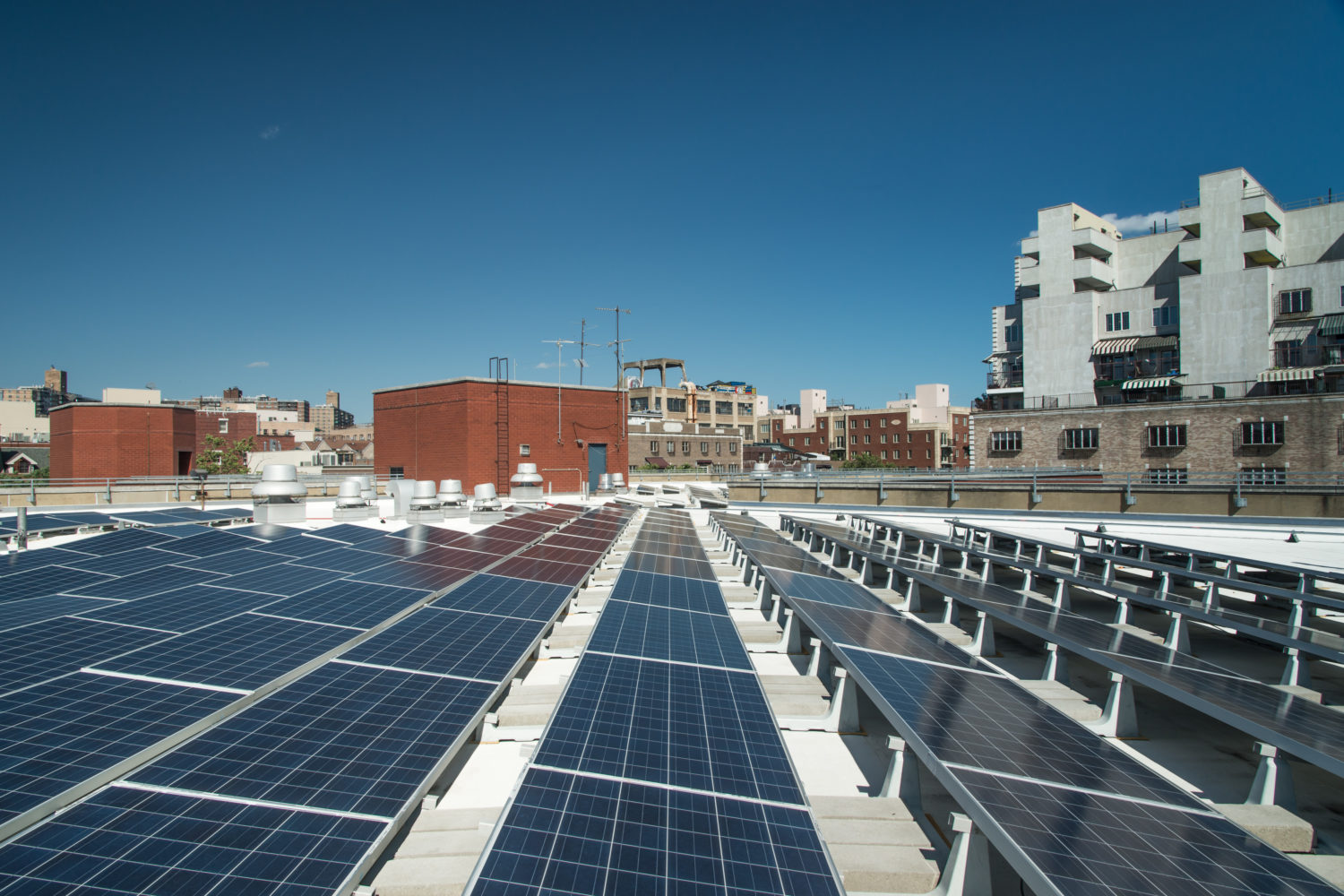
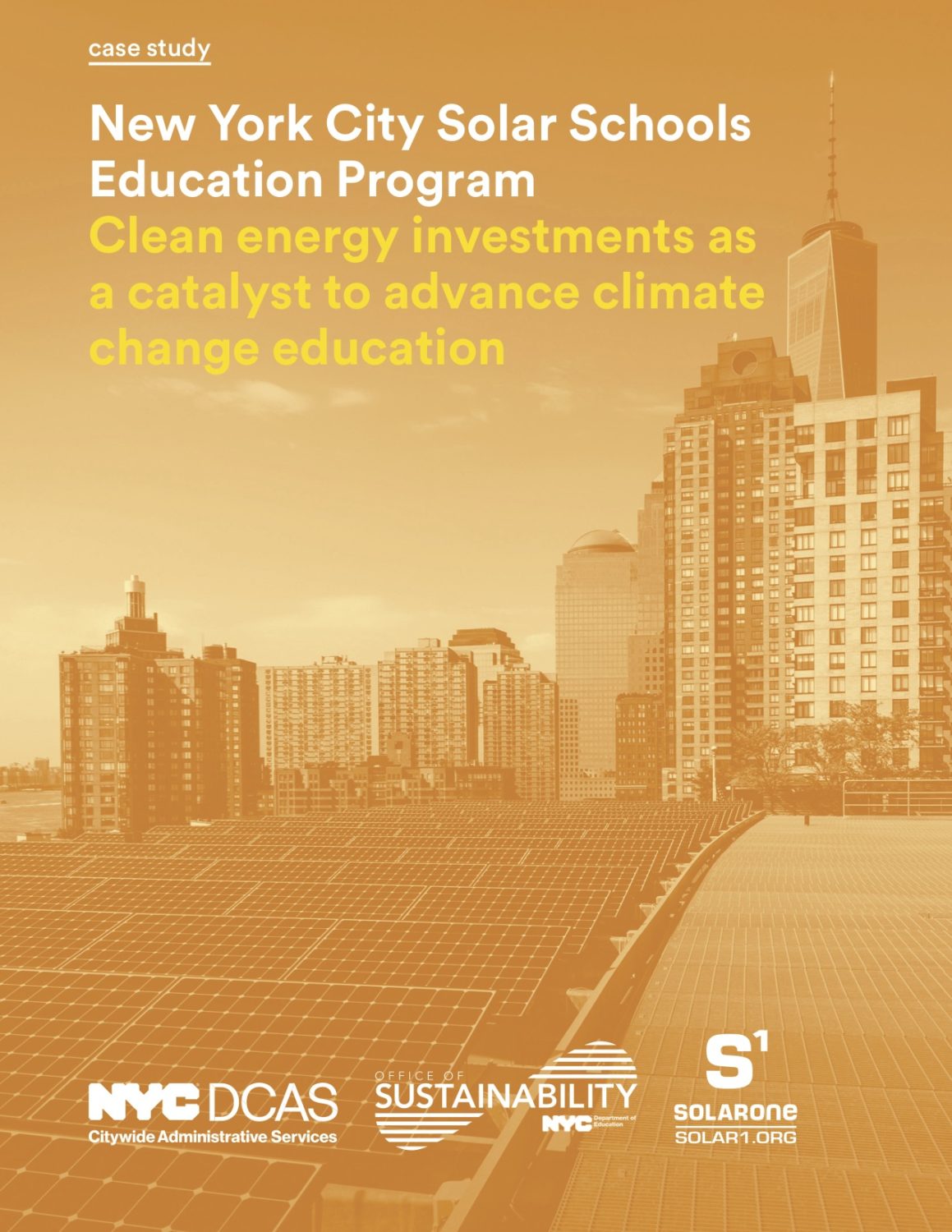
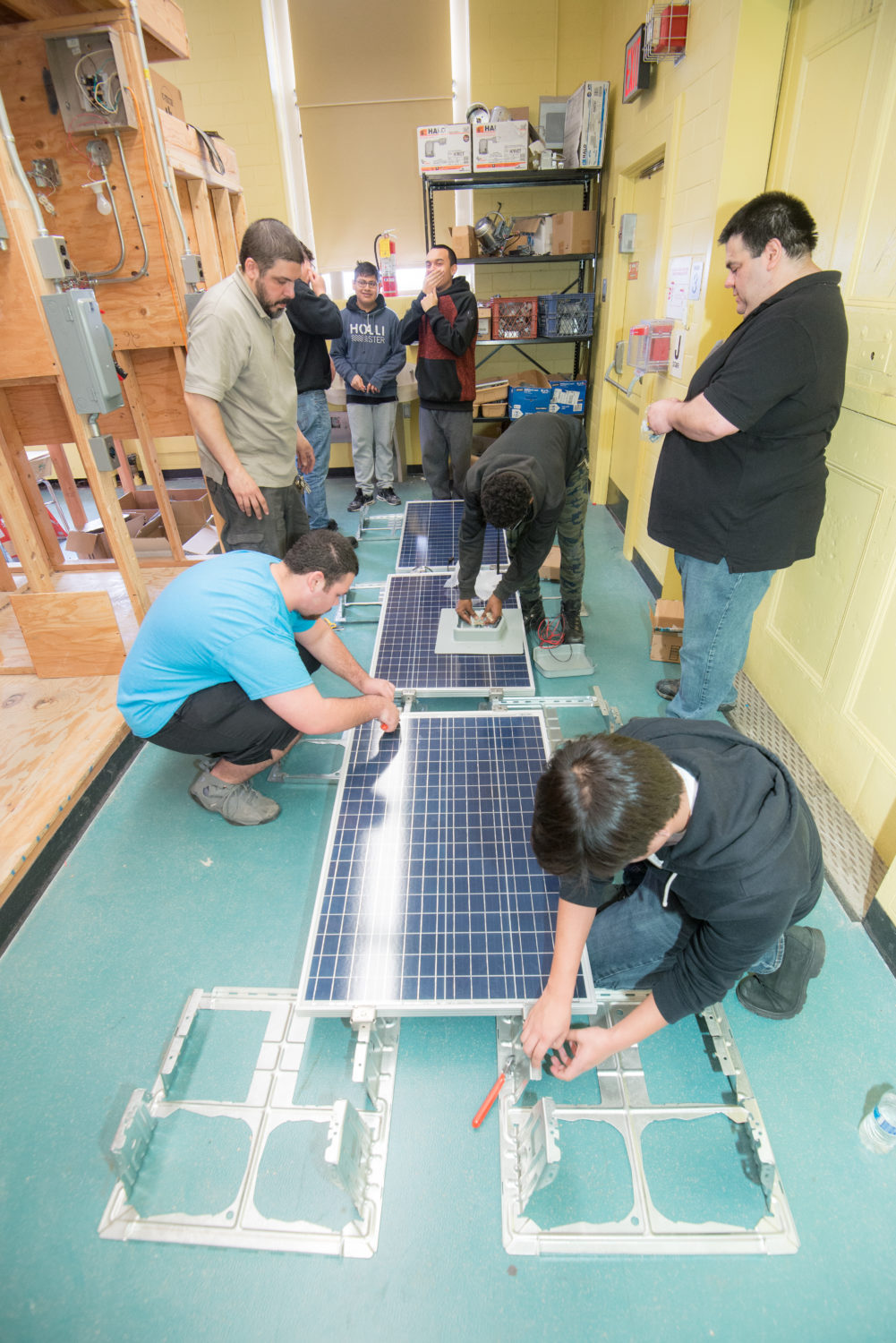
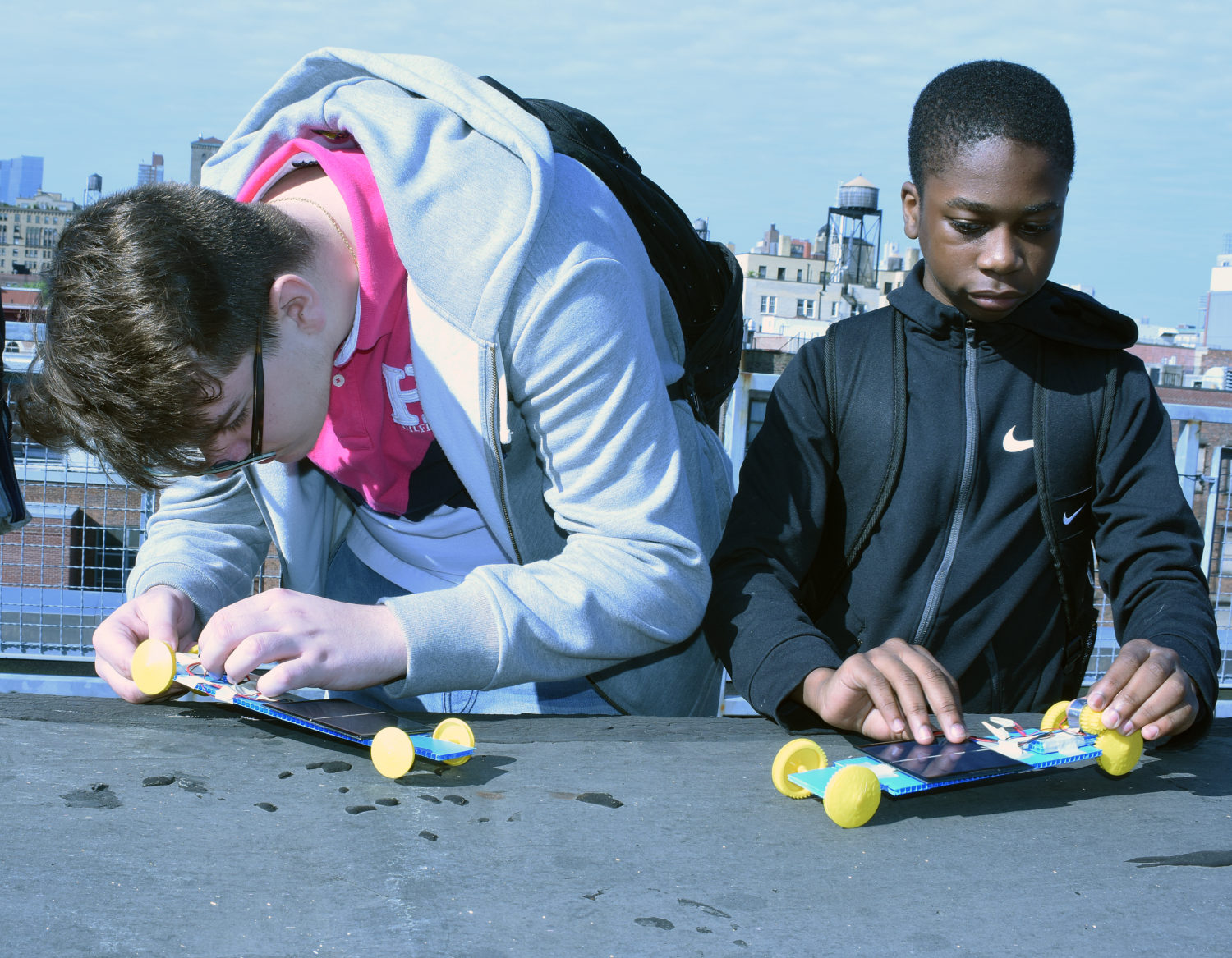
Additional Resources
Solar One
DCAS Division of Energy Management
DOE Office of Sustainability
Benefits
Career and Technical Education: Hands on training can prepare students for jobs in high growth sectors
Leveraging funding from DCAS, Solar One piloted the NYC Solar Career and Technical Education (CTE) Program in collaboration with DOE Sustainability and the DOE Office of Post-Secondary Readiness, which manages DOE’s CTE programs . The goal of the NYC Solar CTE program is to implement solar installation knowledge and skills within existing electrical programs at CTE high schools across New York City.
This hands-on curriculum is focused on i) introducing the benefits of solar energy, ii) the hard skills of solar PV installation, and iii) real world lessons to prepare the students for careers in the field. Electrical, construction, and engineering teachers are trained through a blend of traditional train-the-trainer professional development and on-site support through co-teaching. The co-teaching component is spread out over three years and is designed so schools are equipped to run the program in future years with limited support. First implemented in 2017 at four high schools, the NYC Solar CTE program has now expanded to 11. A research and evaluation phase is planned to identify opportunities for growth and program improvement.
A critical aspect of any training program is connecting trainees to job opportunities. A future goal for the NYC Solar CTE educational training is to link the CTE training programs to Requests for Proposals (RFP) for solar installation services being advanced by the municipality. This type of systematic link between job training programs and career opportunities through City procurement may provide a more direct link to career opportunities.
Lessons Learned
Best Practices: Providing communities across the country with a roadmap to achieve educational programs integrated with their clean tech investments
The NYC Solar Schools team has compiled this set of best practices to guide other communities in their development of similar programs.
Identify: Survey environmentally-driven policies and associated investments to identify educational opportunities
Complete an assessment of city climate and environmental policy priorities and associated investments, such as solar power installations, energy retrofits, or resiliency-focused projects and determine if any initiatives are appropriately suited to catalyze new educational opportunities. Assess existing school programs for ability to incorporate new curriculum or other learning opportunities.
Partner: Develop a robust partnership including diverse stakeholders
Identify environmental and sustainability education innovators, key school decision makers, STEM, career and tech education programs, sustainability champions and relevant agency partners. Select local industry partners to provide career connections and to help source program materials such as solar panels or products that may be helpful for program development.
Align: Link programming with current educational standards
Ensure that new lessons can be easily integrated into existing frameworks, rather than developing a new area of study. In NYC, for instance, the program was carefully integrated into existing state standards and new curriculum instruction was delivered within existing teacher training programs.
Build: Develop a community of practice
The long-term success of a program can be encouraged through the creation of a plan for continuous adaptation and development of a community of practice. This can be furthered advanced through a knowledge-sharing platform to help connect teachers, allowing them to share lessons and tips to improve student outcomes.
Link: Provide exposure to green careers
As renewable energy is a fast-growing jobs sector, building a pipeline to these high-paying jobs is helpful to advance student exposure to new career pathways. Best practices include asking students to complete independent research focused on different types of green careers, providing them with content training that will give them a jump-start on industry-recognized certifications and connecting them with mentorships, internships and other industry exposure.
Conclusion
Supporting climate literacy through education that meaningfully communicates the impacts and solutions about climate change is critical for our children and future generations. Advancing green careers through solar education programs leads to positive outcomes that are both specific and general. Students benefit from an increased understanding of immediate career steps they can take that are aligned with a changing economy while also developing an increased understanding of their ability to make positive environmental change across all aspects of their lives. Introducing students to green jobs and career pathways will help enable the next generation of New Yorkers to contribute to a more just, resilient, and sustainable city in the face of climate change.
“The (NYC Solar Schools) activities are a very effective way to help students understand the challenging concepts of energy and climate change; but also encourage high order thinking, cause and effect, vocabulary skills, and cooperative group work.